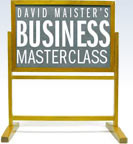

TITLE | TIME |
Strategy Means Saying No | (17:45) |
Why do most firms in an industry end up looking very similar, offering the same services to the same clients, stressing the same client benefits? Because they don’t have the courage to accomplish true differentiation by saying no to off-strategy work.
RELATED RESOURCES:
Blog discussions
NOTES FOR THE EPISODE:
Timeline:
00:29 —
I was helping a prominent global company explore the strategy of achieving high levels of client (or customer) service. We were discussing ways of investing resources and redesigning processes to accomplish this goal. The longer the discussion continued, the more uncomfortable some members of the organization became.
02:30 —
One of the first lessons I was taught at Harvard Business School in the 1970s was Wickham Skinner’s principle of the “focused factory.” No operation, Professor Skinner pointed out, can be good at everything simultaneously.
05:03 —
As obvious as this all may seem, translating it into reality can be very difficult. The practical reality of most businesses is that they find it very difficult to say “no” to a revenue-generating opportunity.
08:00 —
Even when people acknowledge all this, they still come up with many reasons why they think it is unwise (or even forbidden) to say “no.”
11:57 —
Perhaps the single biggest problem in achieving the implementation of a strategy is the difficulty of ensuring that everyone in the organization understands what the strategy is, and that top management really wants everyone else to follow it.
13:19 —
It is incredibly hard even for sincere leaders to get their colleagues and subordinates to believe that they have changed, and that they will manage to new standards — ie have a new strategy.

















